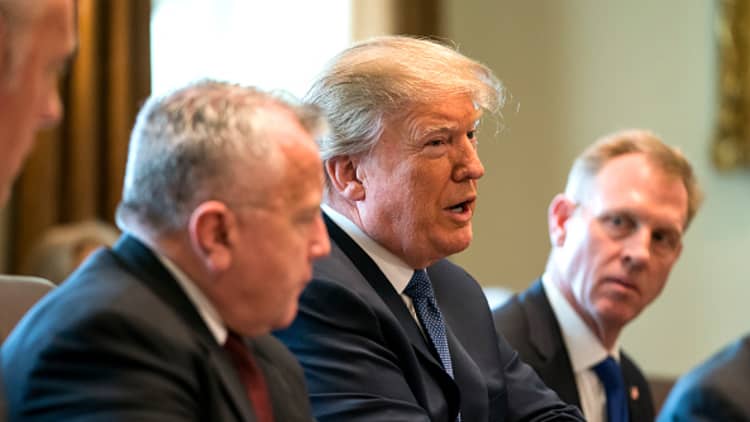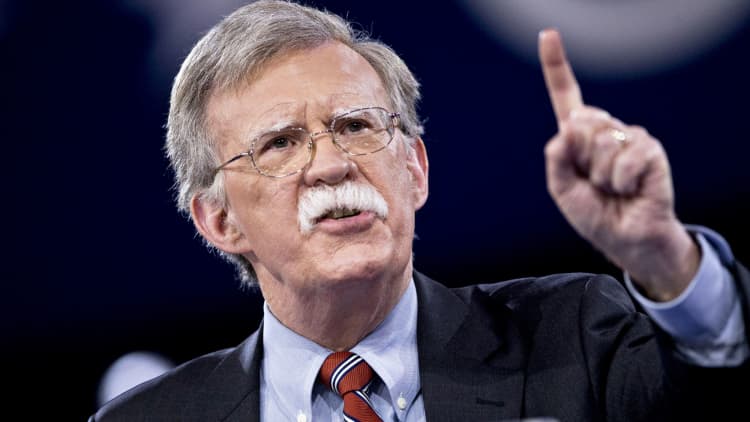
Oil prices rose the most in two weeks Monday, as President Donald Trump mulls a response to a Syrian chemical attack, but crude still reflects very little geopolitical risk.
Earlier Monday, Trump, flanked by John Bolton, his new, hawkish national security adviser, promised a "major decision" on Syria over the next 24 to 48 hours. Analysts said they expect whatever the response, it will be focused strictly on Syria and would not affect oil supplies.
The incident is the latest in the region to spill into the oil market after the Iran-backed Houthis in Yemen attacked a Saudi oil tanker last week, one in a series of recent attacks on Saudi Arabia. However, analysts say the market is currently only reflecting $2 to $3 of geopolitical risk.
"I don't think this becomes an event that limits physical supply from the region, but there are risks," said Bart Melek, head of commodities strategy at TD Securities. West Texas Intermediate crude futures settled at $63.42, a gain of 2.2 percent Monday.
Both Syria's government and Russia denied involvement in the Saturday night attack that killed at least 60 and wounded more than 1,000 in Douma. However, both accused Israel of carrying out attacks the following day on a Syrian air base, killing at least 14 people, including Iranian personnel.
"The market seems to be moving on the trade war story. I think the Middle East stories are important," said Helima Croft, head of global commodities strategy at RBC. "Syria is the trip wire for an Israel, Iran conflict, and Yemen is the trip wire for Saudi, Iran."
Melek said he only expects oil to move slightly higher, possibly to where it will hit resistance at $64.12 per barrel. That would not add much more than the current $3 geopolitical risk premium unless the activity in the Middle East gets more heated or disrupts oil supply.
Croft said one reason oil prices are not moving that much is the sense that the U.S. as an oil producer can add to world supply if there is a disruption.
"Do people really think about what a broader Middle East conflict means for oil?" said Croft, adding at another time oil prices might be flying.
"This is the world that shale has wrought, in that shale has become the ultimate spare supply in the market and shale could plug any supply gap." However, Croft said the market could be wrong because the output from shale drilling may not be as sustainable as expected.
John Kilduff, energy analyst with Again Capital, said the U.S. response may carry more risk now that Bolton is in the White House.

Bolton, former U.N. ambassador, has said the U.S. should act pre-emptively against Iran and North Korea because of their nuclear programs. Bolton is expected to encourage Trump to exit the nuclear agreement with Iran and attempt to reinstate sanctions on the country.
Trump on Monday said he was meeting with military advisers to determine who was responsible— Syria's government, Iran, Russia, or all three.
"Trump was obviously calling out [Russia President Vladimir] Putin and Iran, so it's good timing on Bolton's part," said John Kilduff of Again Capital. Bolton's first day on the job was Monday.
"We will see right away how forward leading he's going to be. This could be a sign of things to come," said Kilduff.
The war in Yemen is viewed as a proxy war between Saudi Arabia and Iran, which backs the Houthi rebels. In recent weeks, there have been missile strikes from Yemen, including several aimed at Riyadh. On a recent weekend, seven missiles were interecepted by Saudi Arabia.
Saudi Crown Prince Mohammed Bin Salman led the kingdom into the regional war after the Houthi rebels forced Yemen's president Abd Rabbu Mansour Hadi into exile. The crown prince has been away for several weeks, visiting the U.S. and now France.
There was speculation the prince would order a retaliation for the missile attacks once he returns. Kilduff said Israel could also become more aggressive against activity in Syria.
"This is part of their beef. They don't want Iran on their doorstep. It's a a preview of the growing worries of what could happen with this Israeli-Saudi alliance that has emerged," he said.
Kilduff said the U.S. response to Syria could temporarily send oil several dollars higher, but in the unlikely event it expands beyond Syria it could be worth another $10 or more.
"The interesting question is what happens in Syria? Does what happens in Syria stay in Syria. With the strikes that happened on Sunday, are we going to see Israel become more confrontational? The question is contagion," said Croft. "Will it stay within Syria or will it spill outside the border. Yemen is already spilling outside the border, with the attacks on Saudi Arabia. You get a fear factor, and the fact that we have these two raging proxy wars in the Middle East, and oil doesn't move on it."
WATCH: US military action against Syria likely




